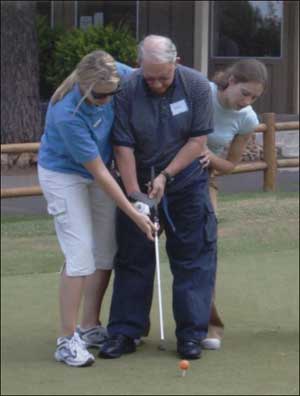Most people take simple tasks such as tying their shoelaces for granted, but not George Moore, a stroke survivor who credits Northern Arizona University’s Rehabilitation Sciences for helping him regain the use of his hand.
“My doctors told me that I would never be able to use my right hand again,” Moore said. “But now tying my shoes is not a problem. I even built a workbench recently.”
Moore is one of about 15 patients participating in NAU’s annual Restoration vs. Compensation summer neurological clinic that takes an intense, daily therapy approach for rehabilitating patients following a neurological injury or the diagnosis of Parkinson’s disease. This is the fifth year for the week-long seminar and Moore hasn’t missed one. Many of the same participants return each year.
The clinic, from June 24 through June 30 in the Department of Physical Therapy, is also a hands-on seminar for doctoral physical therapy students to learn about intensive physical therapy. It’s open to the public and costs $200, but according to Valerie Carter, an assistant clinical professor in Rehabilitation Sciences, there’s a growing waiting list.
“It was believed that the central nervous system—the brain and spinal cord—once injured could not change or grow again,” Carter said. “What science has learned over the past decade or so is that the brain and spinal cord can recover if there is more of a specific type of regular practice that can drive the neurological changes. We’re not only helping our patients, we’re also educating our students by working to move this proven theory from the research lab into the clinic.”
Students teach patients how to measure their successes and then work about six hours a day in physical therapy, such as assisted walking on treadmills with a supportive harness, and completing functional activities with the involved hand of a stroke survivor.
“The brain and spinal cord can change and build stronger and better neurons if they are forced to work again,” Carter explained. “This is not a miracle cure. These patients work their tails off to gain new functions.”
Carter and program creator Kay Wing, a physical therapist who owns SWAN Rehab in Phoenix, are getting ready to publish their five-year data. They often lecture around the country about the techniques and evidence-based theories utilized in the clinic.
Meanwhile, Moore can now hug his wife with both arms and hold on with both hands when four-wheeling.



